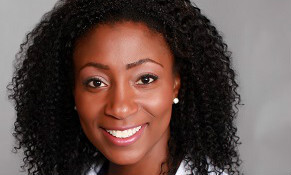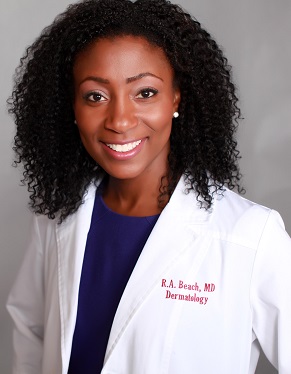Faces of U of T Medicine: Dr. Renée Beach

Liam Mitchell

Dermatologist Dr. Renée Beach wants to ensure all skin tones receive the best care possible. She also wants to ensure medical school admissions is as fair and transparent as possible to attract the best students. Beach spoke with Faculty of Medicine writer Liam Mitchell about her career path and efforts to support those who want to follow in her footsteps.
What inspired your interest in medicine?
It sounds simple and possibly cliché, but the inspiration was and is to help others. It's about translating the medical knowledge I have into information a patient can understand/relate to. I also get joy out of it – it’s really gratifying to be able to diagnose a patient, explain what they have, and treat the condition and improve it. Sometimes treatment involves an actual prescription, and sometimes it just involves making a lifestyle adjustment. I think what attracted me to dermatology in particular, is that the conditions are obvious because they are visible. I don't have the (difficult) task of convincing patients of the need for treatment, as a physician treating blood pressure might, when patients come to see me. I have the benefit that the patient sees their condition and it concerns them enough to seek help, which can make people more open to taking treatment, using prescriptions and/or following my advice.
You practice dermatology with a specific interest in treating dermatologic disease in a broad range of ethnic skin types. Can you tell me more about your work?
Sure. I work at Women's College Hospital and in Private office. In both settings, I see patients who range in age from infants to elderly and with a range of skin tones/ethnicities. In training, I found that textbooks primarily presented skin conditions in patients with white skin and often lacked sufficient representation of, or information about, patients with other skin types. I sought out and still seek out texts and journal publications that document conditions often seen in non-white skin types. Patients with brown or black skin do not want to be shortchanged for diagnostic expertise or therapeutic suggestions. I do my best to keep up to date with my knowledge base in general and as it pertains to conditions that disproportionately afflict patients with brown and black skin in particular.
You serve as the BPAO's representative on the Black Medical admissions subcommittee at the University of Toronto Medical School Admissions committee. What drives your interest in the admissions process and what can U of T do to recruit and retain more Black medical students?
I was a member of the admissions committee at McMaster University where I attended medical school and have retained an interest in the process. Admissions to medical school is about making the gateway to medicine as fair and transparent as possible so as to attract a breadth of intelligent, balanced, compassionate and interesting future physicians. I think that the big piece to recruiting and retaining black physicians is preparation – having "pipeline" programs that educate students about medicine as an option, about how to use summers off to enroll in programs or volunteer or job shadow, and prioritizing education as a student's first "job". I think specific outreach programs that bridge from elementary to high school to university can help provide support and a consistent narrative to students so that the idea of "becoming a doctor" is fostered and encouraged over time. Together, with Mr. Ike Okafor and the Community of Support at U of T some of us will be participating in an event that promotes black students' preparation for entry into the field of Medicine. This event will occur Apr 1 at OiSE.
Why hasn’t the number of Black physicians grown significantly?
I think it is multifactorial. One detail is that we actually lack data on the number of black physicians – both in Ontario and in Canada. These statistics are just not taken. I think it would be helpful to take them officially and get a sense of the scope of the issue and lack of representation.
Some contributing factors I see are that some capable students are simply not informed of the possibility of medicine as a career. They do not get access to mentorship programs or other information sessions that can introduce them to the profession. As has been said, "you cannot be what you cannot see."
We also have a disproportionate amount of black students who are socially or economically disadvantaged and need to prioritize caring for family members or part-time work, or other responsibilities that may impact the ability to focus on academics and certain extra-curricular activities like volunteerism, etcetera that are traditionally lauded on medical school applications.
Unfortunately, we do hear of educators who encourage students into other fields such as trades, rather than medicine or scientific research. There is nothing wrong with a career as a tradesman – except if you do not desire to be in the trades. Young students are suggestible and may believe that a suggestion made by an educator is really their only viable career option. I also think that some black students buy into the "that's not for people like me" fallacy. The idea of pursuing excellence, in some circles and peer groups, is seen as not "keeping it real." This is a narrow and false mindset that cripples our students and should be flatly rejected.
Are there enough role models and mentors in medicine available to Black students, and if not, what’s the impact?
I do think that there are enough role models and mentors in medicine for black students. I think there are enough because we cannot assume that all qualified mentors must be black in order to be effective. The mentor has to be enthusiastic and available to the mentee. And that requirement has no suggested race/ethnicity. I think the issue is students being assertive enough to seek them out. Some students seek me out, and I correspond with them or meet with them, but oftentimes, these students do not follow up. I do think that the benefit of a black student having a mentor who is also black is that the student may feel more comfortable discussing racialized issues or struggles we may face as visible minorities
What advice do you have for Black students considering a career in medicine?
My advice would be:
- Get excellent undergraduate marks - (un)fortunately, your GPA matters for applying to MD programs, and can sometimes be a barrier to being a competitive applicant for a large number of MD programs;
- Take courses that you can learn in and excel in – this doesn't always mean taking biochemistry. If you enjoy biochemistry, then great. But taking non-science courses is recommended and will definitely help you in the practice of medicine; it involves ethics, aspects of anthropology, sociology, even religion;
- Seek a mentor – somebody who is where you envision yourself in the future, somebody who is an elder and can provide you with some advice, perhaps even job shadowing. The mentor's demographic does not matter - what matters is the mentor's interest in you/ desire to help you; and,
- Pursue your non-academic interest – Dance? Sports? Travel? Hiking? Singing? – make time for the world outside the traditional classroom so that you have some perspective and are able to develop other aspects of your personality and talent.
Faces of U of T Medicine introduces you to some of the interesting men and women studying in and working with the Faculty of Medicine. From advising political leaders to providing care to Toronto’s most vulnerable populations, our students and partners are impacting communities at home and around the world. Do you have an interesting story to share? Send us an email at medicine.communications@utoronto.ca.